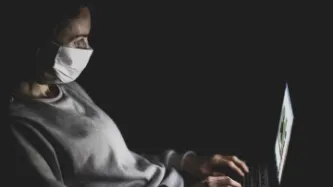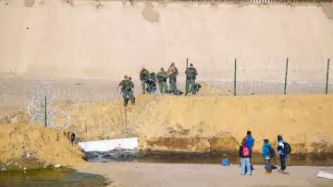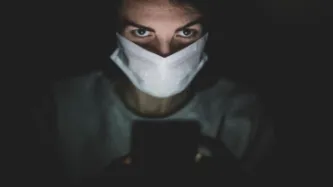Advanced Search
Content Type: Examples
The World Health Organization will partner with major blockchain and technology companies to launch a distributed ledger-based platform to be dubbed "MiPasa" that it says will facilitate "fully private information sharing between individuals, state authorities, and health institutions" by cross-referencing siloed location and health data to create global insights. The WHO believes the system can ensure patient privacy. MiPasa also expects to host an array of publicly accessible analytics tools…
Content Type: News & Analysis
These are difficult and challenging times around the world.
In this global crisis, businesses are stepping in to support efforts by Governments and public health authorities to seek to control the impact of the virus.
This is important, as help of all kinds is sorely needed. However, we must also be wary that industry initatives and public-private partnerships are not used as an opportunity to profit from this crisis or to exploit data without legal safeguards.
Companies all over the world…
Content Type: Advocacy
Privacy International welcomed the opportunity to contribute to the consultation on the Principles on Identification for Sustainable Development. Valuable lessons have been learnt, particularly in the last few years, on the serious consequences of identity systems. We have seen challenges in court that have found that key provisions of these systems are incompatible with the right to privacy enshrined in constitutions. We have seen civil society organisations highlighting the serious risks…
Content Type: Examples
Mexico is one of the biggest buyers of next-generation surveillance technology. And now data leaked to Forbes indicates it's taken an unprecedented step in becoming the first-known buyer of surveillance technology that silently spies on calls, text messages and locations of any mobile phone user, via a long-vulnerable portion of global telecoms networks known as Signalling System No. 7 (SS7).
The revelation was contained in what an anonymous source close claimed was…
Content Type: Examples
The whistleblower said they were unable to find any legitimate reason for the high volume of the requests for location information. “There is no other explanation, no other technical reason to do this. Saudi Arabia is weaponising mobile technologies,” the whistleblower claimed.
The data leaked by the whistleblower was also seen by telecommunications and security experts, who confirmed they too believed it was indicative of a surveillance campaign by Saudi Arabia.
The data shows requests for…
Content Type: News & Analysis
Lockdowns and quarantines are an extraordinary measure that help in slowing down the global COVID-19 pandemic, and protecting the population.
However, they come at an even higher cost to some individuals, such as victims of domestic violence, persons in a vulnerable situation, and human rights defenders, who face specific threats that are exacerbated by measures taken by governments to address the global pandemic.
In that context, states should adopt special measures to keep those people…
Content Type: Examples
8 europeans telecoms providers (Vodafone, Deutsche Telekom, Orange,Telefonica, Telecom Italia , Telenor, Telia and A1 Telekom Austria) have agreed to share mobile phone location data with the European Commission to track the spread of the coronavirus.
The Commission said it would use anonymsed data and aggregated mobile phone location to coordinate the tracking of the virus spread. They also announced the data would be deleted after the crisis.
Source: https://www.reuters.com/article/us-…
Content Type: News & Analysis
Amid calls from international organisations and civil society urging for measures to protect the migrant populations in Greece and elsewhere, last week, the European Commission submitted a draft proposal to amend the general budget 2020 in order to, among other measures, provide assistance to Greece in the context of the COVID-19 outbreak.
Both at the Turkish-Greek border and in the camps on the Greek islands, there are severe concerns not only about the dire situation in which these people…
Content Type: Press release
Efforts to contain the virus has led to a wave of surveillance initiatives unprecedented on its global scale. Now, a global coalition of civil society organisations is calling on such initiatives to respect human rights by adhering to eight recommendations.
Measures imposed so far range from the use of informants, police monitors, hand stamping, and public naming of individuals, to the high-tech use of tracking apps and mass surveillance tools. An analysis by PI has found telecommunications…
Content Type: Examples
South Africa's Communications Minister, Stella Ndabeni-Abrahams, has stated that telecommunications operators in the country have agreed to provide location data to identify how many people have been infected in a particular area. The Government has broad powers under a national state of disaster.
Writer: Philip de Wet
Publication: Business Insider
Content Type: Examples
The Mumbai police have been asked by the civic governing body to track the movements of people arriving at Mumbai airport through the GPS location of their phones. Arrivals at the airport in Mumbai are also being stamped with “Proud to protect Mumbaikars. Home quarantined” with the date until which they have to remain in home isolation.
Source: https://indianexpress.com/article/india/coronavirus-mumbai-civic-body-turns-to-phone-gps-to-enforce-home-quarantine-rules-6321098/
Writer:…
Content Type: Examples
Bulgarian police forces have been authorised to request and obtain metadata from citizens' private communications from telephone and Internet operators. The powers are reportedly to be used to monitor those under compulsory quarantine, and will allow police to track their movement as well as "monitor who they talked to and which sites they visited". The Interior minister, Mladen Marinov, told a public television platform, Referendum, that the “new legislation only applies to…
Content Type: Examples
The Armenian National Assembly is considering identifying the contacts of people infected with Covid-19 through cell phone location data. The draft was tabled by the government. If approved, the operators of the public electronic communications networks will be obliged to provide information on customer location and phone calls to the authorities.
Source: https://en.armradio.am/2020/03/30/armenian-government-proposes-using-cell-phone-data-to-track-contacts-of-covid-19-patients…
Content Type: Examples
Authorities in Montenegro have published on a government website lists of individuals who are in mandatory self-isolation after returning home from abroad. The lists, structured by municipality, include full name, isolation date, and hometown. The government made the decision to do this after discovering that some people were breaking quarantine, on the basis that they were putting the rest of the population at risk. The Civil Alliance has asked the Constitutional Court to review whether the…
Content Type: Examples
After police officers in Paraguay posted videos of themselves punishing people who have been caught breaking quarantine on social media, Paraguayans expressed outrage over their actions. The punishments seen in the videos, which were recorded and shared by the officers themselves, include threatening people with a taser to force them to do star jumps or making them repeat "I won’t leave my house again, officer" while lying face down on the floor. The country's interior minister, Euclides…
Content Type: Examples
Although the alerts about contacts with people infected by the coronavirus sent out via SMS by the South Korean government do not include names, the information included about people who tested positive for coronavirus, and their past locations can be revealingly detailed in some cases. Those who have been identified by this means have suffered offline and/or online harassment; others, without being specifically identified by name, have been mocked. A survey has found that as a result people…
Content Type: Examples
The UK's National Health Service is collaborating with Palantir to launch a data platform that will track the movement of critical staff and materials; it will, for the first time, give ministers a dashboard showing the first-ever comprehensive view of the entire health care system. The data Palantir gathers into a data store from across the health sector will not include individual patient data; instead, it will include A&E capacity, calls to the NHS 111 hotline, and the number and…
Content Type: Examples
After the British government announced a national lockdown, Derbyshire Police used drones to capture footage of people rambling, walking their dogs, and taking photos in the Peak District. The move was widely criticised as heavy-handed and counter-productive; however, the government followed up by saying that people should stay near their homes for exercise and not travel unnecessarily and granting police new powers to enforce the lockdown.
Source: https://www.bbc.co.uk/news/uk-england-…
Content Type: Examples
In a widely circulated animated heat map, the geospatial visualisation company Tectonix GEO in partnership with the location technology company X-Mode used the secondary locations of anonymised mobile devices that were active on a single beach in in Ft Lauderdale, FL during spring break to show how the beach-goers fanned out across the US afterwards, potentially carrying infection with them. Although the visualisation was instructive in showing how contagion spreads, it was unclear whether any…
Content Type: Examples
The Ministry of Administration and Local Self-Government of the Republic of Srpska, an entity within Bosnia and Herzegovina, published the full and hometowns of the first 30 people who broke quarantine on March 23. The move was condemned by the Initiative for Monitoring the European Integration of Bosnia and Herzegovina, arguing that the move could lead to discrimination, stigmatisation, and even lynching, that there was no legal basis for removing protection from personal data, and…
Content Type: Examples
The European Commission urged Europe's telecoms giants, including Deutsche Telekom and Orange, to share their users' mobile data streams from across the region to help predict the spread of the coronavirus "for the common good". In a letter in response, Dutch Renew MEP Sophie In't Veld stressed that that data must remain anonymised, and questioned the usefulness of aggregating very large quantities of location data from millions of Europeans who are locked down. Meanwhile, questions are being…
Content Type: Examples
Argentina's Public Prosecutor's Office will start installing an app on the smartphones of those who violate government-ordered quarantine in the cities of Santa Fé and Rosario. The app will be installed by the province's Criminal Investigation Agency to track those who are under criminal investigation for violating quarantine. The app will send reports to the the MPA investigation office and coordinated by the Attorney General's Office. Individuals will be required to sign a document…
Content Type: Examples
On March 23, Argentina's immigration agency, Dirección Nacional de Migraciones (DNM), announced that anyone arriving in the country would be required to install the free COVID-19 Ministry of Health app on their phone for 14 days to ensure they comply with quarantine rules in order to protect the population. The Office of the Chief of Staff had instructed the DNM to adopt this policy when it launched the app, also on March 23. Since launch, the number of unnecessary permissions the app requests…
Content Type: Examples
Researchers at Germany's Robert Koch Institute and Fraunhofer Heinrich Hertz Institute are working on an app that uses Bluetooth connections between smartphones and is compliant with GDPR to anonymously save the distance and duration of contact between people on the smartphone to make it possible to digitally reconstruct infection chains. The idea is being copied from Singapore's TraceTogether app, which detects other users who have also installed the app. If someone tests positive, they can…
Content Type: Examples
Indonesian Ministry of Communication and Informatics/KOMINFO official website)
On Thursday, 26 March 2020, the Indonesian Minister of Communication and Informatics, Johnny G. Plate, issued the Ministerial Decree No. 159/2000 to facilitate the cooperation between the Government and telecommunication companies in developing a tracking app called TraceTogether. The app collects 14 days of mobile phone location data from the infected person, and then matches it to location data collected by…
Content Type: Examples
The Israeli Ministry of Health's mobile app, "The Shield", is intended to alert users if they have been at a location in Israel at the same time as a known COVID-19 patient.
The app, which is available for both Android and iOS, works by collecting the GPS and WiFi network (SSID) information of a user's mobile device throughout the day. This data is saved only on the mobile device and is not transmitted to the Ministry of Health, other government agencies, or any organisation. The locations…
Content Type: Examples
In a partnership with G3 Global Berhad, a system combining thermal scanning technology and facial recognition from SenseTime has been put in place at Malaysia's King's Palace. The combination is intended to trigger alerts, as well as detect and identify people even when they're wearing face masks in order to detect infected individuals in a non-contact way without requiring added manpower.
Source: https://www.biometricupdate.com/202003/biometric-checks-and-facial-recognition-payments-to-…
Content Type: Examples
In Jojutla, a municipality in the southern state of Morelos, the government is using drones, normally used for security tasks such as reducing homicides, to surveille gatherings in public parks and plazas and tell people to go home, at the same time distributing hand sanitiser gel and face masks on public roads, in popular neighbourhoods, and on public transport. So far there are no confirmed cases of COVID-19 in Jojutla, and only two confirmed and 23 suspected in the state.
Source: https://…
Content Type: Examples
A web form to screen COVID-19 cases developed by the Mexico City government collects a wide range of personal information such as name, age, telephone number, home address, social network username, and cellphone number. The privacy notice establishes that such data may be transferred to a vast array of judicial and administrative federal and local authorities.
Source: https://test.covid19.cdmx.gob.mx/
Writer: Mexico City government
Publication: Mexico City government
Content Type: Examples
Owing to concerns about the possibility of spreading the coronavirus via banknotes and payment cards, Russia has begun testing its Unified Biometric System (EBS) for payments at a selection of grocery stores including Lenta supermarkets. The Russian bank VTB plans a mass roll-out for mid-2020. For the beginning of 2021, Promsvyazbank is planning trials of facial biometric payments, a system the bank is negotiating to introduce with several retail chains. Facial biometric payments are made…




